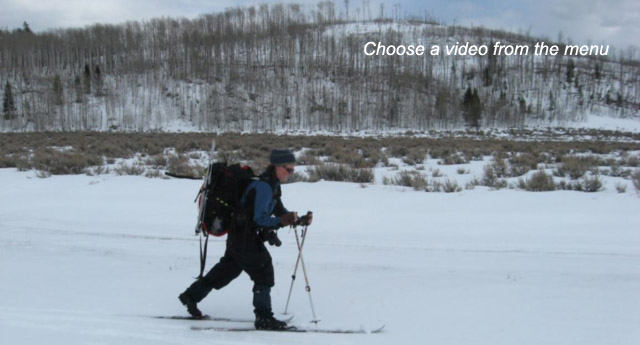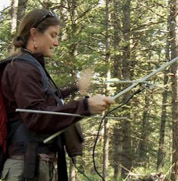Taza Schaming

Taza's Profile

1. What is the focus of your research?
I am studying the impact of the decline of Whitebark Pine tree populations on Clark's Nutcrackers, birds that live year-round in the mountains of western North America. Whitebark Pine trees have suffered massive die-offs in the past few years, due to the recent Mountain Pine Beetle epidemic and infections from blister rust, an invasive pathogen. The birds use seeds from the pine as food, but the trees also need the birds to plant their seeds. Nutcrackers collect pine seeds in the fall, and each bird buries up to 35,000 Whitebark Pine seeds per year. Seeds that the birds do not eat during the winter and spring can germinate and grow into new trees.
I am studying a population of Clark's Nutcrackers in Bridger-Teton National Forest in Wyoming. Here, the birds are still relatively abundant, but I am worried that their populations may soon decline. In this area, Whitebark Pine trees recently started dying, and without their seeds the nutcrackers may not find enough food. Tromping through snow at 9,000 feet, I am radio tracking and surveying Clark’s Nutcrackers to study the birds and their habitats. I am interested in learning what they eat, how much they move around to collect food, and how they relate to each other socially. My ultimate goal is to identify conservation management actions that could help nutcrackers survive in this region in the midst of environmental change. I’d like to help manage these ecological communities so as to maintain a healthy ecosystem and make it possible for Clark’s Nutcrackers to survive.
2. What got you interested in this line of research?
I always knew I would be a scientist, but I didn’t know exactly what I wanted to do. So I read as much as possible about the ideas in which I was interested and took lots of science in high school. I also volunteered and interned for various research projects and traveled around the world hauling my bags of field guides. Over time, I have learned that there are four things I want to do in my career: work outside, study birds, spend as much time as possible in the mountains, and study science directly related to conservation. I have always loved being outside and I have always spent a lot of time in the woods. I grew up learning the names of the birds I saw, finding nests near my house and watching baby birds grow, but it wasn’t until I was in college that I realized that it was actually possible to have a career studying birds. I knew I specifically wanted to work in the mountains ever since I climbed my first mountain, Tongue Mountain, near Lake George, New York, when I was eleven years old. I am fascinated by the animals and plants that are able to survive in such a harsh environment. (At my study site in Wyoming it is sometimes literally freezing in the middle of July!) Very little research is carried out in the subalpine and alpine partly because it’s so remote and difficult to get to and work in. Therefore, we don’t know a lot about the plants and animals that call these areas home. When I started graduate school, I learned about the decline of the Whitebark Pine trees in the Rocky Mountains and realized that we really have no idea how the decline of the tree is really affecting the rest of the ecosystem, particularly the birds that depend on the trees for food. I knew I had found a really important scientific question to study that was important to conservation in the world today.
3. Where did you grow up, and how does this relate to what you are doing now?
I grew up in a log cabin in the Helderberg Mountains outside of Albany, New York, where I spent my free time outside in the thousands of acres of woods that extended beyond my backyard. I learned tracking, bird identification, and outdoor survival skills. I watched birds, bugs and other animals, and asked questions about how the world works, then learned the answers, and then asked more questions. Even in grade school, I knew I would become a scientist because I enjoyed being outside in the woods so much, and I loved learning as much as possible about all the animals and plants and ecosystem processes I saw. I always knew that if I worked hard enough, I could do whatever I wanted when I grew up, and what I wanted was to work outside, studying science, helping make the world a healthier, better place.
4. What do you like to do in your spare time?
I spend as much of my free time as possible outside. I love to snowboard, cross-country ski, and snowshoe in the winter. I spend a lot of my days off in the Wyoming backcountry snowboarding – snowboarding in places that I have to hike hours to get to where few other people are. In the summer, I spend a lot of time fishing for trout, hiking and rock climbing with friends. I really like to dance and I try to go out to see live music a few times a month. I love to read and though I spend a lot of time reading scientific articles, I also read lots of good books. I also love to travel when I have time, and since I finished high school I have traveled throughout the United States, Tanzania, Kenya, Nepal, Malaysia, Australia, New Zealand, The Netherlands, Argentina, Bolivia, Peru, and Chile.
5. Why is it important for us to conserve biodiversity, and how does this relate to your career path?
Biodiversity is basically all life on earth. We need to protect biodiversity for lots of different reasons. First, our personal health is related to the health of the planet. We all need clean water to drink, clean air to breathe, and good food to eat. Secondly, we don’t even know how many different kinds of organisms live on the planet, but we do know lots of species are going extinct every year. How this may directly affect each of us is very difficult to know. Even if the extinction of one species doesn’t make a huge difference in our individual lives, the extinction of any species always affects other people, trees, plants, animals, or insects. The extinction of lots of species will eventually affect us all. We don’t even know exactly how, but we realize that the world is so interconnected that the effects of losing biodiversity will decrease ecosystem stability and will make the world unhealthy. The world we live in is also beautiful because of the biodiversity. Our planet is full of amazing animals, plants and ecosystems, and there is so much we still don’t know about how the world works. We need to conserve biodiversity because it is so exciting to see, to learn about, and because it is just incredible that the world has evolved to be the way it is. For my career, I am focusing on better understanding the biodiversity in the world’s alpine and subalpine regions so that I can learn how to help protect these communities.







